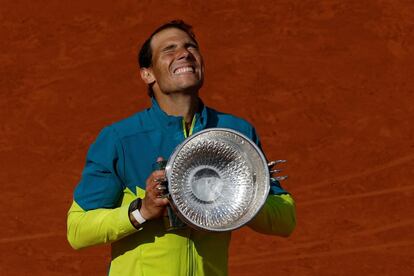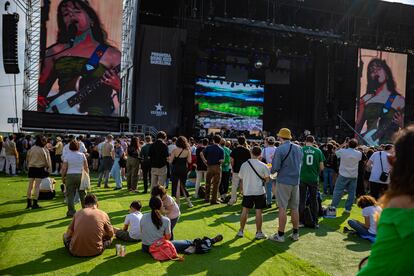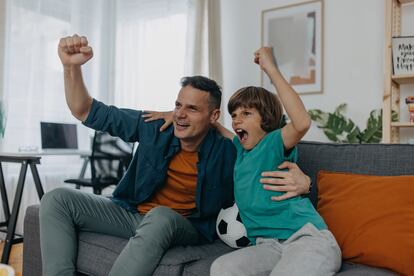‘Being a father with gray hair is cooler’: The joy and the dilemma of being a dad in your forties
Embracing fatherhood can be a predicament when you want to keep your essence intact. However, for a new generation of fathers, a baby doesn’t necessarily mean that the party is over

“I have known men who father with lucidity, humor and humility, but I have also seen dear friends, who seemed to have the heart in the right place, turn away from their children to give themselves over to a desperate and cartoonish recovery of their youth. And there are also many who face the death drive by overwhelming their children with missions and commandments, with the explicit or veiled intention of keeping their interrupted dreams alive at their expense. What impresses me, in any case, is the almost absolute lack of a tradition,” writes the Chilean author Alejandro Zambra in Literatura infantil (Children’s literature). A question emerges from his words: are there not some key principles to lay the foundations of a dad culture in 2023? After all, boomer dads also faced a dilemma between throwing themselves into their family and keeping a mental and temporal space for themselves.
Andrés Neuman (46), author of the novel Umbilical, which centers on the subject of paternity, believes that there are two stereotypes when dealing with parenting. “One is that of the enlightened model, the one who seems to have seen the light and who, after becoming a father, gets rid of his previous self. I understand this model to a certain degree, especially at the beginning of parenthood, when you don’t recognize your life or your body and your routine is shaken up in such a way that it is tempting to think that you are not the same. However, an effort must be made to distinguish the daily logistics of who you are, which include your memories, the way you used to be, what you have done... all of that affects that chaotic present, and will be passed on in the upbringing,” he reflects. “Then there is the stereotype of ‘a child is not going to change me.’ One denies the past and the other denies reality, and when the present is shaken up, some things do change forever,” he continues.
The writer uses as an example the case of tennis player Rafael Nadal (37), who, when asked if paternity would affect him, denied it with a deep conviction. “He didn’t see that perhaps the difficulty in recovering from injuries is not only related to age, but rather to the fact that he no longer rests as much as he used to because he is a father, so his mental energy is no longer just focused in hitting the ball. Both stereotypes have denial in common. I think that what actually happens is somewhere between those two overdramatizations,” says Neuman who, as a father, claims to feel more like a disciple of his son.

The designer Xavier Gallego (41), vice president of brand marketing at the biotechnology company MycoWorks, admits that he had problems managing his role as a father while having an active life in which he travels, enjoys art and meets people. “Nothing that can’t be overcome with some therapy, right? Sometimes you have to adjust, because you come from having total control of the 24 hours of your daily life. [When they become parents] for the first time, men, who tend to be morally more selfish, want to die before anyone else. Women feel more important during the first years [of the children’s lives], while we are kind of disconnected. Suddenly, your children start to give you certain human reactions, like a smile, and that’s when you see that your life will no longer be the same. Your priorities change,” he points out.
Neuman notes that love is intensified with the awareness of death: “I secretly say goodbye to my son every day, just in case. I feel like there is no time to lose, and that is something that, in some way, my son has given me. You don’t have time for a lot of things, but you are also playing all day. It’s that feeling of not having time and spending all day playing, dealing with tantrums, changing diapers… it becomes part of a playful choreography.”
Is the party over?
When talking about abandoning or displacing a part of oneself, it is hard not to think about partying or going to those music festivals that sometimes are a breath of fresh air for exhausted parents. Some take their children to these affairs, which are offering more and more family-friendly resources, like carts with cushions for babies to rest using noise-cancelling headphones. Some festivals even allow minors of up to a certain age to enter for free. To what extent, then, does paternity signify that “game over” that Alejandro Zambra proclaims in Chilean Poet when he declares that “being a father consists of throwing the match until the day when the defeat is real”?

“I’m afraid that [the need to party] is the hardest part of raising girls,” says Johann Wald (44), host and producer of the Radio Primavera Sound podcast. “For about four years I will not return to that wonderful routine of meeting up in the evening to hang out and talk nonsense with friends. And it’s depressing, because when you become an adult, the space between seven and eleven at night is the space of pleasure, of drinking... you meet new people in passing, which is always refreshing, then you go to dinner at one of those places where they offer the good stuff. Perhaps you’re in the mood for a cocktail later. But then, that magical space becomes the space where you have to bathe, feed and put the babies to bed every day and, even if you can negotiate one night a month with your partner, your body asks for a higher frequency. By not getting it, depression may appear. But hey, everything comes back, as other parents assure me.”
“There is no such thing as a non-father,” states Xavier Gallego. “What is cool is being a father and going to have a few drinks, going to a concert and being able to share it. When I go to a concert, in fact, I think of my partner and my daughter, Nico. I am always a father. Being a father with gray hair is cooler than not being a father and not having gray hair. If we want to do something, we notify the plans in advance. You have to adjust it within a structure.”
Andrés Neuman explains that, at the age of 40, there are certain concerns that are no longer related to going out: “I’m clear now that you do not have great epiphanies at night. I plan to continue going out, but what worries me most now is not going drinking anymore, but how many years my son and I will live together in this world. Faced with these concerns, the rest takes a secondary role.”
A new generation of fathers
What happens when a man suddenly finds himself acting like his father did in the past? Is there a reconciliation, or a rejection of those similarities? “I began to see my father’s reflection in me before my daughters were born; fortunately he was a really cool man, so it wasn’t the trauma that perhaps others have suffered,” remarks Johann Wald. “Like my father, I had them at an age in which it aches when I bend over to pick up a little ball, but I make the necessary effort. It’s the cost of having lived at ease for so long.” Xavier Gallego says that he does notice a great disparity between the way he reacts and the way his father did; for instance, when faced with a tantrum. “You realize that you are a father, that your daughter is just like you were at her age, and at the same time you don’t understand the way your father reacted in those situations, although I do have the empathy of the times. There has been a brutal change, in just one generation, in the way we deal with parenting and discipline – if that exists.”
“You can be happy, inferior, brilliant or stupid with or without children. Having them or not having them is no guarantee of anything, but my generation has leaned towards having babies late, and this is an important fact, because in the past men became fathers when they were 20, and there was greater concern about losing their job, as they were only starting their working life,” explains Andrés Neuman.
The myth (?) of the childish millennial father
Some people believe that new fathers, as a generation, are incapable of leaving their own childhood behind, as proved by their love of video games, comics and so many other forms of pleasure that are traditionally associated with youth. Wald agrees: “For better or worse, I belong to a generation of kidults who still believe we are the Goonies and cry our eyes out when an actor from our childhood receives an Oscar. Fortunately, there are things like Studio Ghibli, which make more sophisticated movies to watch with my daughters than Peppa Pig, which is a bore, or Paw Patrol, which is not very stimulating. I’m counting down the days until I can show them Adventure Time,” he declares.

Gallego believes that the best thing people can do is to continue to be themselves, although he admits that, in practice, being able to do so is a privilege. “We are not judged so much, we have more flexibility, we can be ourselves, we play video games when we have to, we party when we feel like it and we are more present. The world is moving towards gender equality, and this is helping to adjust the family model, which favors having more time to do things besides just providing, educating and being a father.”
Neuman sees life, by definition, as unbalanced; strong emotions are hardly ever balanced. “As fatherhood is one of the most powerful emotions, the utopia of balance can lead to frustration. There are other types of balances which are more desirable, although I would have to speak of a certain reciprocity or proportionality in the roles,” he concludes. “Among couples, sharing the imbalance is a more reasonable goal.”
Sign up for our weekly newsletter to get more English-language news coverage from EL PAÍS USA Edition
Tu suscripción se está usando en otro dispositivo
¿Quieres añadir otro usuario a tu suscripción?
Si continúas leyendo en este dispositivo, no se podrá leer en el otro.
FlechaTu suscripción se está usando en otro dispositivo y solo puedes acceder a EL PAÍS desde un dispositivo a la vez.
Si quieres compartir tu cuenta, cambia tu suscripción a la modalidad Premium, así podrás añadir otro usuario. Cada uno accederá con su propia cuenta de email, lo que os permitirá personalizar vuestra experiencia en EL PAÍS.
¿Tienes una suscripción de empresa? Accede aquí para contratar más cuentas.
En el caso de no saber quién está usando tu cuenta, te recomendamos cambiar tu contraseña aquí.
Si decides continuar compartiendo tu cuenta, este mensaje se mostrará en tu dispositivo y en el de la otra persona que está usando tu cuenta de forma indefinida, afectando a tu experiencia de lectura. Puedes consultar aquí los términos y condiciones de la suscripción digital.









































